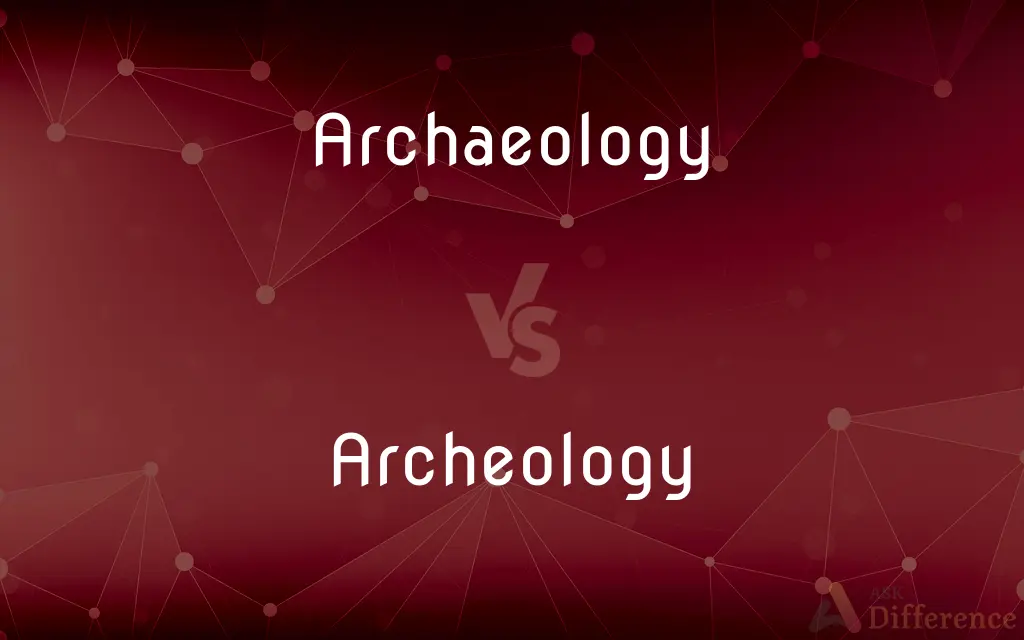Archaeology vs. Archeology — What's the Difference?
By Tayyaba Rehman & Urooj Arif — Updated on March 26, 2024
Archaeology emphasizes the study of human history through artifacts, while archeology is an alternate spelling of the same term.

Difference Between Archaeology and Archeology
Table of Contents
ADVERTISEMENT
Key Differences
Archaeology is the scientific study of human history and prehistory through the excavation and analysis of artifacts, buildings, and other physical remains. Archeology, on the other hand, is simply a variant spelling of archaeology, used interchangeably in many contexts.
The spelling difference between archaeology and archeology primarily reflects regional preferences, with "archaeology" being more common in British English, whereas "archeology" is often seen in American English. Despite these variations, both terms refer to the same field of study and share the same objectives and methodologies.
Both archaeology and archeology involve methods such as excavation, surveying, and the use of technology to uncover information about past human societies. These fields contribute to our understanding of history, cultures, and the evolution of human civilizations.
The choice between archaeology and archeology does not imply a difference in the scope or approach of the discipline but rather aligns with spelling conventions. Professionals in this field, regardless of the spelling they prefer, engage in similar research activities and aim to contribute to our collective knowledge of human history.
The distinction is largely academic and does not affect the nature of the work conducted by archaeologists. Both terms are accepted in academic and professional circles, though "archaeology" is more widely used in publications and by institutions around the world.
ADVERTISEMENT
Comparison Chart
Definition
The study of human history through material remains.
Alternate spelling of archaeology.
Spelling Preference
Preferred in British English and international contexts.
Often used in American English.
Objectives
Understanding human history, culture, and evolution.
Identical to archaeology.
Methodologies
Excavation, surveying, artifact analysis.
Identical to archaeology.
Professional Use
Used by scholars, institutions, and publications worldwide.
Used interchangeably with "archaeology," depending on regional spelling conventions.
Compare with Definitions
Archaeology
Aims to provide insights into the development of human cultures.
Studying pottery to understand ancient trade networks.
Archeology
Shares the same goals as archaeology, focusing on the study of past human activities.
Archeologists analyzing bone tools to deduce prehistoric diets.
Archaeology
Archaeology explores human history through artifacts and sites.
Archaeologists excavating ancient ruins to learn about past societies.
Archeology
Archeology serves as an alternate spelling to archaeology.
American texts may use archeology for simplicity.
Archaeology
Involves a wide range of techniques to uncover the past.
Using satellite imagery to locate buried structures.
Archeology
Accepted in professional and academic circles, depending on spelling conventions.
Archeology journals published in the United States.
Archaeology
"Archaeology" is the preferred spelling in British English.
British scholarly articles typically use archaeology.
Archeology
More commonly seen in American English contexts.
Some American institutions prefer archeology.
Archaeology
Widely used in academic settings and publications.
Archaeology courses offered at universities around the world.
Archeology
Employs the same scientific methods for research.
Conducting fieldwork to excavate a newly discovered site.
Archaeology
Archaeology or archeology is the study of human activity through the recovery and analysis of material culture. Archaeology is often considered a branch of socio-cultural anthropology, but archaeologists also draw from biological, geological, and environmental systems through their study of the past.
Archeology
Variant of archaeology.
Archaeology
The systematic study of past human life and culture by the recovery and examination of remaining material evidence, such as graves, buildings, tools, and pottery.
Archeology
(American spelling) archaeology
Archaeology
The study of the past by excavation and analysis of its material remains:
Archeology
The branch of anthropology that studies prehistoric people and their cultures. Same as Archæology, etc.
Archaeology
The actual excavation, examination, analysis and interpretation.
The building's developers have asked for some archaeology to be undertaken.
Archeology
The branch of anthropology that studies prehistoric people and their cultures
Archaeology
The actual remains together with their location in the stratigraphy.
The archaeology will tell us which methods of burial were used by the Ancient Greeks.
Archaeology
The academic subject; in the USA: one of the four sub-disciplines of anthropology.
She studied archaeology at Edinburgh University.
Archaeology
The science or study of antiquities, esp. prehistoric antiquities, such as the remains of buildings or monuments of an early epoch, inscriptions, implements, and other relics, written manuscripts, etc.
Archaeology
The branch of anthropology that studies prehistoric people and their cultures
Common Curiosities
Do archaeology and archeology use different methodologies?
No, they employ the same scientific methods and approaches to study past human activities.
Is there a difference between archaeology and archeology?
No, they refer to the same discipline; the difference is solely in spelling.
Which spelling is more correct, archaeology or archeology?
Both spellings are correct; the choice depends on regional or institutional preferences.
Can an American archaeologist use the spelling "archaeology"?
Yes, American archaeologists can use "archaeology," especially in international contexts or personal preference.
Do universities choose one spelling over the other for their courses?
Yes, universities might choose a spelling that aligns with their country's linguistic practices.
Why are there two spellings for archaeology?
The two spellings reflect regional linguistic preferences, with "archaeology" being British English and "archeology" American English.
Does the spelling difference affect professional recognition?
No, professionals are recognized based on their work and contributions, not the spelling of their field.
Are there specific journals that prefer one spelling over the other?
Some journals may have a preference based on their editorial guidelines or regional conventions.
Is one spelling more modern than the other?
No, both spellings are contemporary; the choice is more about consistency with regional English usage.
Can the choice of spelling indicate an archaeologist’s nationality?
It might suggest a preference, but it's not a reliable indicator of nationality since many use the terms interchangeably.
Share Your Discovery

Previous Comparison
Christmas vs. Adam
Next Comparison
Fealty vs. FidelityAuthor Spotlight
Written by
Tayyaba RehmanTayyaba Rehman is a distinguished writer, currently serving as a primary contributor to askdifference.com. As a researcher in semantics and etymology, Tayyaba's passion for the complexity of languages and their distinctions has found a perfect home on the platform. Tayyaba delves into the intricacies of language, distinguishing between commonly confused words and phrases, thereby providing clarity for readers worldwide.
Co-written by
Urooj ArifUrooj is a skilled content writer at Ask Difference, known for her exceptional ability to simplify complex topics into engaging and informative content. With a passion for research and a flair for clear, concise writing, she consistently delivers articles that resonate with our diverse audience.















































